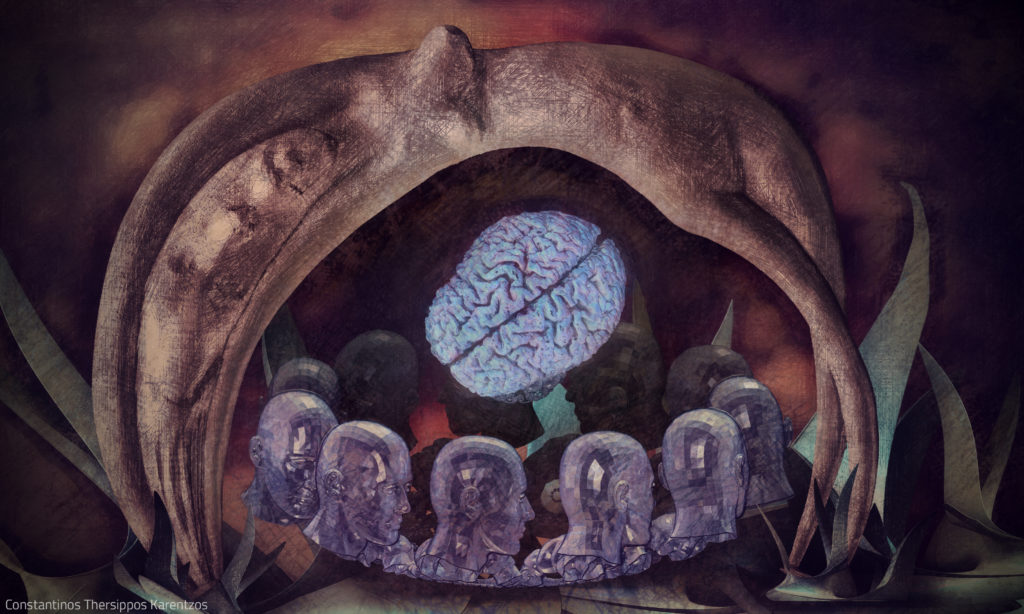A team of researchers recently published a study in the journal Psychosis exploring how sex and sexual and gendered content manifest within psychotic experiences. The team, led by Dr. Nev Jones, conducted interviews and focus groups with people whose lives have been impacted by psychosis and their results illustrate that many individuals experience sexual content as part of their psychotic experiences and that these instances are tied to culturally loaded power dynamics.
These experiences may also be accompanied by feelings of shame that go undisclosed in therapy settings. The authors discuss identifying these themes informally in their work as an impetus for their study:
“In comparing anecdotal experiences, we noticed that sex- and gender-related themes are common, but associated with additive stigma, and also under-explored and under-acknowledged within the current research literature.”

In recent decades, little to no research has explored the connection between experiences of sexuality and psychosis. While some studies have studied the sexual content of psychotic symptoms or associations between sexual trauma and later symptoms, personal accounts of the various manifestations of sex, sexuality, and gender within the context of psychosis have not yet been included in the research literature. The purpose of this study was to investigate how sex, sexuality, and gender manifest in the lives of individuals who have been impacted by psychosis.
Historically, sexuality has been featured in the conversation surrounding psychosis. Early Freudian theory, for example, explored the psychosexual aspects of ‘schizophrenia.’ Contemporary explorations of sexuality and psychosis seem to have come to a halt in the 1990s, however. Jones and colleagues understand this to have possibly occurred alongside the increased prominence of the psychiatric understandings of psychosis. With this came the shunning of psychoanalytic theory as well as a focus on a biomedical approach rather than on phenomenology and individual experiences.
In this study, qualitative interviews and focus groups were conducted with the intention of gaining a deeper understanding and appreciation of the various ways sexuality manifests in individuals’ lives. Interviews and focus groups centered around sex or gender-related content. Jones and colleagues recruited individuals through local mental health agencies, hearing voices network groups, and advocacy listservs.
A total of 49 people participated in focus groups (n = 24) and individual interviews (n = 25). All reported receiving a diagnosis of “schizophrenia spectrum disorder” at some point in their lives. Interview content was analyzed qualitatively through phenomenological methods to develop themes that emerge from individual experiences.
The findings demonstrated that 68% of those interviewed and 20.8% of those in focus groups “described explicit content or aspects of their experience of psychosis involving sex, sexuality or gender.” The researchers grouped these accounts into five major thematic clusters.
1.) Varieties of experience. There were a diverse array of ways themes involving sex, sexuality, and gender manifested in individuals’ experiences. A unifying feature of these stories involved interviewees expressing a lack of opportunity to discuss and explore these experiences elsewhere, including never having shared these topics with a mental health professional.
For example, some participants described perseverations related to sexual terms, fantasies that were erotic, hearing voices with strongly sexualized or gendered names, and hallucinations of both terrifying sexual violence and positive sensual experiences. Additionally, some participants spoke to psychotic experiences that destroyed their sexuality (rendered them asexual), voices that bullied them about their same-sex attractions, and voices that ceaselessly commented on their sex acts.
Some of these themes were discussed as they related to individuals’ past experiences and other individuals described only engaging with these questions or ideas after a delusional experience. Another group of participants denied any direct connection to their real-life experiences.
2.) Shame and persecution. In many cases, interviewees described hearing voices or seeing signs in their daily life that were shame-laden and reminded them of socially marginalized experiences (e.g., past sexual assault or survival sex work) or identities (e.g., LGBTQ).
3.) Sexual or sexualized violence. Participant experiences of psychosis often included themes of sexual violence that differed across gender identities. This was true for both participants who had past sexual violence experiences and those that did not. Men described instances of psychosis involving them as the perpetrator of sexual violence whereas women described victimization. For others, sexual violence became a critical theme that arose continuously in relation to broader groups aside of themselves. For example, those that related to ideas of homophobia.
Participants expressed a range of reactions about these experiences including shame, guilt, and embarrassment. Some expressed concerns of responsibility for these experiences or that they may be tied to them in a “deeper, psychological” sense.
4.) Gender, sexuality, agency, and power. This theme centered around the intersection between personal experiences of direct power dynamics manifesting in sexual experiences and social power dynamics that symbolically manifest as well. The researchers write:
“While most of the experiences involving sexual(ized) violence certainly involved clear power dynamics, including physical as well as emotional threats, relational dynamics involving or premised on symbolic, social, or cultural power also manifested in non-violent, gendered or sexualized ways.”
The researchers discuss this theme in terms of the complicated and culturally loaded experiences of sexuality that occur within the context of psychosis. This involves the understanding of how one “matters” and functions as capable of acting on others and being acted upon themselves. Some individuals narrated processes of empowerment and redemption related to these experiences.
5.) Positive experiences of the erotic. While some of the above experiences of sexuality were described as violent, many participants described positive manifestations of arousal that were, at times, associated with spiritual or creative states.
Notably, the prevalence of shame-laden experiences connects to research that has explored shame as a factor in the potential development of psychosis as well as shame as a mediator between traumatic experiences and the severity of post-traumatic symptomology. Jones and colleagues note that “Additional phenomenological work is crucial for unpacking the relationship between shame and experiences of social marginalization in psychosis.”
The findings of this study highlight the prevalence of sexual or gendered content within psychotic experiences in this sample as well as how these experiences are interpersonally, developmentally, and socioculturally significant. The meaning-making that participants engaged in featured individual religions/spiritual beliefs, cultural attitudes, personal struggles regarding identities, and experiences related to sexual assault or perceived romantic failings.
The authors emphasize that “psychosis is a broad umbrella term,” and therefore, the experiences of individuals impacted by psychosis are “profoundly heterogeneous.” Their work was exploratory, not confirmatory, and warrants future investigations into cross-cultural variations. Future research is also needed to unpack what these findings mean for therapeutic relationships and the social process of recovery. The researchers conclude:
“Although not focused on sex/sexuality more specifically, our work uniquely contributes to a growing body of literature concerning cultural or cross-cultural influences on the phenomenology of psychotic experiences.”
****
Jones, N., Rosen, C., Kamens, S., & Shattell, M. (2018). “It was definitely a sexual kind of sensation”: sex, sexual identity, and gender in the phenomenology of psychosis. Psychosis, 1-10. (Link)















“Related Articles” is missing . Psychosis= antipsychotic given or forced.
https://www.madinamerica.com/2015/04/antipsychotic-induced-sexual-dysfunction-reported/
https://www.madinamerica.com/2017/11/side-effects-stories-sexual-dysfunction/
Report comment
I think that negative erotic is when male actors in porn movies has got no visible heads. So rude. Hillman go beyond this ego medical BS, erotic is poetic, psyche is poetic, because human are poets, not biological machines. If I went to psychiatry with every sign of, what they call – mental illness I would be dead already, I won’t go, because they don’t like gods there like Jack Nicholson, they prefer docile stupid egoic plebs without any knowledge of semantics manipulations or phenomenology, because psychiatry use false empirism and false semantics, I AM POET SO I KNOW BETTER THAN THEM WHEN WORDS MEANS NOTHING. When you see EVERYTHING through shitty glasses, you will see only shit. They really like to see shit everywhere.
Read Hillman, not to learn him by heart, but for seeing psyche from another advanced dimension, I read Hillman, many many years ago, in your language and I was shocked, really. Especially because of invisible differeneces between theology and psychology There s no even awarness of this hidden semantics manipulatiuon. Theology kills psychology, that’s the fact. We are materialists and empirists, we give a strange name to sth which is seen as not normal and then we search for the causes…There’s no logic in this false empirism. And for example, I am sad so I have depression and the causues of my depression is chemical imbalance. I feel in love with woman so I am a lesbian, because……I am who I am ——-should be enough. We are gods and docile plebs are those who search for their name given them by authority,because they can’t accept the truth. People are weak, not because they feel depressed, but because they want to feel happy all the time and reject death, and this should be stopped, this terrorism of happiness. Read Hillman. We don’t have mental problems, we have problems with those who want us to believe that mental illness and mental health exists. To reject false cure is to accept the cruel truth about human nature. tHE RISE OF THE THERPEUTIC SOCIETY SHOULD BE STOPPED. READ Hillman REVISIONING PSYCHOLOGY or suicide and the soul. Because without this awarness we wouldn’t be able to see the roots of false semantics. Szasz is not enough, Szasz run away from psyche, he was a nihilist. To give new meaning to death/psyche is our duty as humans.
http://www.newkabbalah.com/hil2.html
Report comment
“Researchers Explore Sexuality and Gender in the Context of Psychosis”
MIA is really scraping the barrel to find articles these days. LOL.
Report comment
I do agree, the “mental health professionals” know less than nothing about how sex relates to the psychiatric drugs or “psychosis.” The “mental health professionals” do NOT know that Wellbutrin, illegally marketed as the “happy, horny, skinny” drug, can cause odd sexual side effects and weight loss, despite the fact it does. They misdiagnose these odd, antidepressant induced, iatrogenic side effects as “hyper sexual behavior” and “bipolar,” despite this being a blatant misdiagnosis, even according to the DSM-IV-TR.
And trying to “cure” the common symptoms of antidepressant discontinuation syndrome by adding an antipsychotic will likely create “psychosis,” via antidepressant and/or antipsychotic induced anticholinergic toxidrome. A known psychiatric drug induced poisoning which is conveniently missing from the DSM billing code “bible,” thus it is always misdiagnosed, resulting in increased iatrogenic harm.
https://en.wikipedia.org/wiki/Toxidrome
But an anticholinergic toxidrome induced “psychosis” will NOT necessarily stop the odd sexual side effects of the antidepressant. This type of antipsychotic induced “psychosis” will just add “voices” to the odd sexual side effects. In my case, this resulted in a pastor “voice” supposedly bragging about raping me. If I were a Catholic, such a situation could result in my being made a saint, but not so in my childhood religion.
Thankfully, the rape and child abuse bragging “voices”/”psychosis,” that resulted from the anticholinergic toxidrome induced “psychosis,” do go away after being weaned from the drugs. It’s absurd our “mental health professionals” assume a “genetic” etiology, rather than actually looking for the real etiology of the illnesses they create with their psychiatric drugs.
But making such assumptions does make an ass out of, not just me, but you too. Being “hyperactive” about finding the etiology of how I was made sick did, at least, result in my finding the medical proof that the antipsychotics do, indeed, create “psychosis,” the primary positive symptoms of “schizophrenia.” And the antipsychotics/neuroleptics also create the negative symptoms of “schizophrenia” too, via neuroleptic induced deficit syndrome.
https://en.wikipedia.org/wiki/Neuroleptic-induced_deficit_syndrome
Which means the antipsychotics, the so called “gold standard schizophrenia treatments,” do indeed create both the positive and negative symptoms of “schizophrenia.” And when a “cure” creates the symptoms of a disease, this means that the primary etiology of such a theorized illness is likely iatrogenic, rather than “genetic.” So much for the scientific validity of the “sacred symbol of psychiatry.”
Report comment